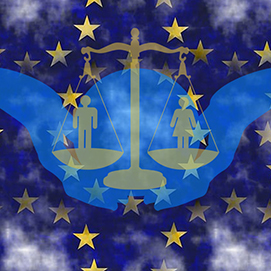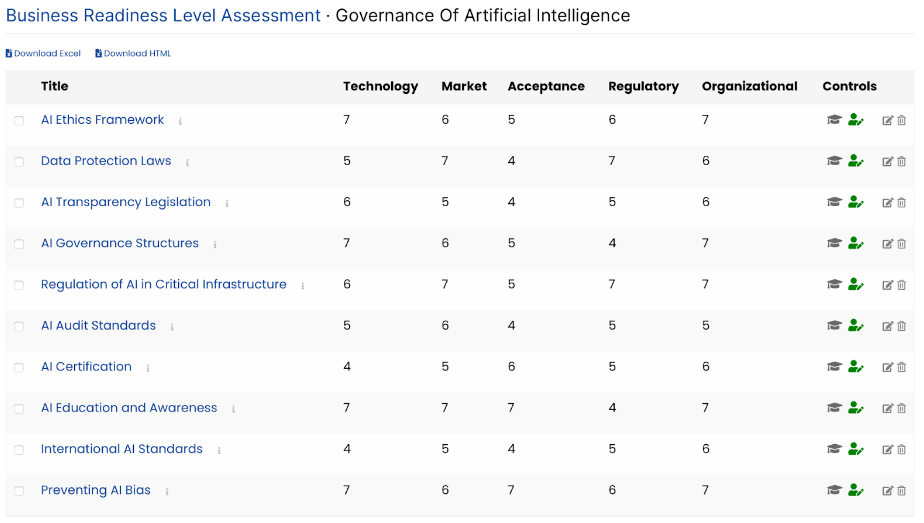
This week' discoveries in our mini-series covering China, the US and Europe, will reveal a future Europe as a region with a continued profound impact during the coming decade in terms of the governance of technologies, sustainability, and multilateralism..
1) Governance of Technologies
Europe is poised to continue to make significant contributions to the governance of technologies in the next decade. The European region will double down as a forerunner in recognizing the critical importance of establishing ethical and regulatory frameworks for emerging technologies to ensure their responsible development and deployment.
- Governance of Artificial Intelligence (AI) and the use of Data: Europe is taking a proactive approach to regulating AI and data usage - especially in relation to consumers. In 2023, the European Commission has already proposed the Artificial Intelligence Act, which aims to set clear rules for AI in areas that can affect fundamental rights, such as healthcare and law enforcement. This Act is forming the foundation for further regulations to come with focuses on transparency, accountability, and fairness in AI systems. Additionally, the General Data Protection Regulation (GDPR) will continue to be a global standard for data privacy, and Europe is likely to strengthen these data protection regulations in the coming years.
- Digital Services and Competition: Europe will remain keen to address the dominance of tech giants in the digital space. The Digital Services Act and the Digital Markets Act already adopted by the European Commission, will further seek to regulate digital services and promote fair competition. These acts aim to ensure that large tech companies adhere to rules that prevent anti-competitive behavior and protect users' rights. Over the coming years, this will become increasingly impactful and influence almost every aspect of our lives. The EU will strive towards maintaining the same speed in development and adjustments of regulations as the speed of digital services development.
- Cybersecurity and Digital Sovereignty: Europe recognizes the importance of cybersecurity in an increasingly digital world. The European Union Agency for Cybersecurity (ENISA) will play a crucial role in promoting cybersecurity best practices amongst citizens, public services organizations and private businesses. Europe's emphasis on digital sovereignty seeks to ensure that European countries and thereby their citizens have control over their own digital infrastructure and data in our digital future.
2) Sustainability
Europe will remain committed to advancing sustainability and addressing climate change over the next decade and beyond. The European Green Deal is at the forefront of these efforts, aiming to make Europe the world's first climate-neutral continent by 2050.
- Climate Action: Europe will seek to accelerate the implementation of policies to reduce carbon emissions, transition to renewable energy sources and to promote energy efficiency. The European Union's Emissions Trading System (ETS) and the Fit for 55 package - making reducing EU emissions by at least 55% by 2030 a legal obligation - are key initiatives aimed at achieving ambitious climate goals. Europe's leadership in clean energy and electric vehicle adoption - in razor sharp competition with China - will have a significant impact on global efforts to combat climate change.
- Circular Economy: Europe will further promote the concept of a circular economy, where products and materials are reused, repaired, and recycled to reduce waste and environmental impact. Initiatives such as the Circular Economy Action Plan are expected to drive innovation in sustainable product design and resource management over the coming 10 years. Maybe setting the foundation for a new and innovative circular economy sector.
- Biodiversity and Conservation: Europe will strengthen its commitment to preserving biodiversity and protecting natural ecosystems. The EU Biodiversity Strategy for 2030 sets ambitious targets for halting biodiversity loss and restoring ecosystems. Europe's focus on sustainable agriculture and conservation efforts will contribute positively to global biodiversity conservation during the next 10 years - maybe developing into a leading force.
3) Multilateralism
Europe continues to champion multilateralism as a key principle in international relations. The region actively participates in and supports international organizations and agreements.
- Diplomacy and Conflict Resolution: Europe will continue to play a significant role in diplomatic efforts to resolve global conflicts and crises. The EU will remain dedicated to and involved in mediating international disputes and promoting peaceful solutions. This may prove to develop into a joint effort between the UK and the EU as we have seen over the past couple of years in relation to the war in Ukraine. The 7th October terrorist attack by Hamas on Israel is likely to be the next major test of and opportunity to further develop the skills, intelligence and power in diplomacy and conflict resolution.
- Human Rights and Democracy: Europe is a staunch defender of human rights and democracy on the global stage. The region will continue to support initiatives and organizations that uphold these principles and advocate for their promotion worldwide. Europe's ability to defend and to strengthen the conditions for growing democracy across the world may be critically important over the coming decade.
- International Cooperation: Europe's commitment to international cooperation is evident in its support for organizations such as the UN, the WHO and the WTO. All organizations with significant activities in and influence from Geneva. Europe will continue to actively engage in international dialogues on a wide range of issues, from global health to trade. Europe will seek to strengthen fundamental democratic institutions throughout the coming decade.
In summary, Europe's contributions in the next decade will revolve around responsible technology governance, sustainability, and active participation in multilateral efforts. These contributions will not only shape the European continent but will also have a significant impact on the global stage, influencing the direction of technological innovation, environmental conservation, and international cooperation.
|
Exploring the future with our new release of the Shaping Tomorrow platform We have now added a comprehensive Business Readiness Level Assessment - BRLA to our platform, covering readiness levels across: Technology, Market, Acceptance, Regulatory and Organizational domains for the up to 10 most significant business aspects in relation to any scan that you have made. |

To learn more about our BRLA capabilities, just click HERE
Stay informed,
Matthew, Shaping Tomorrow